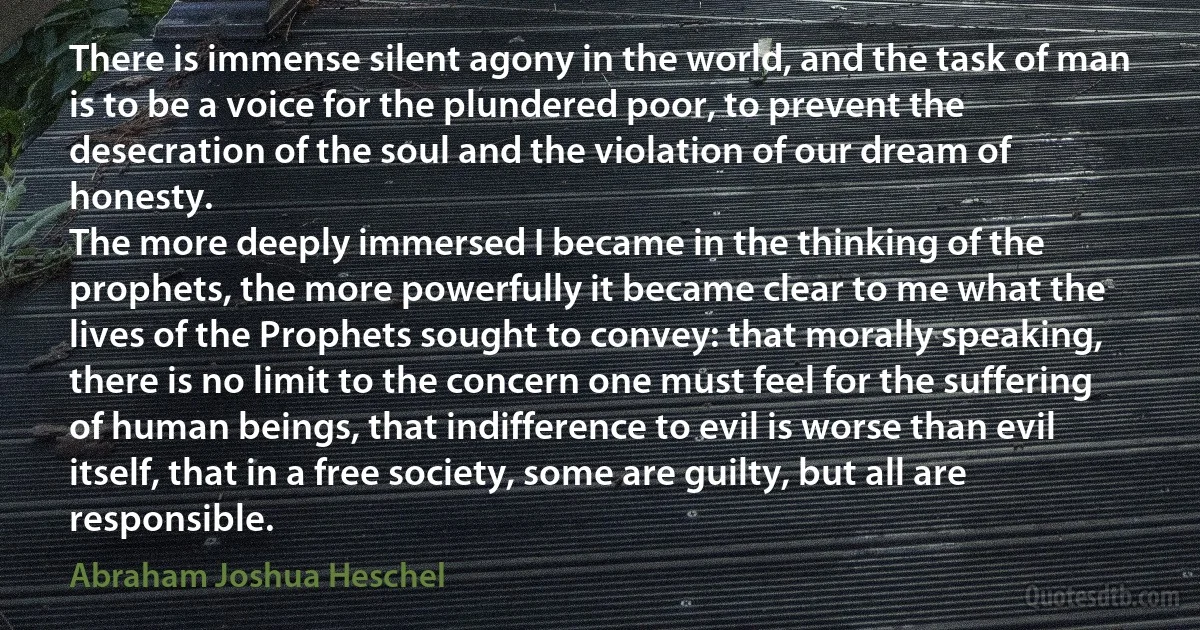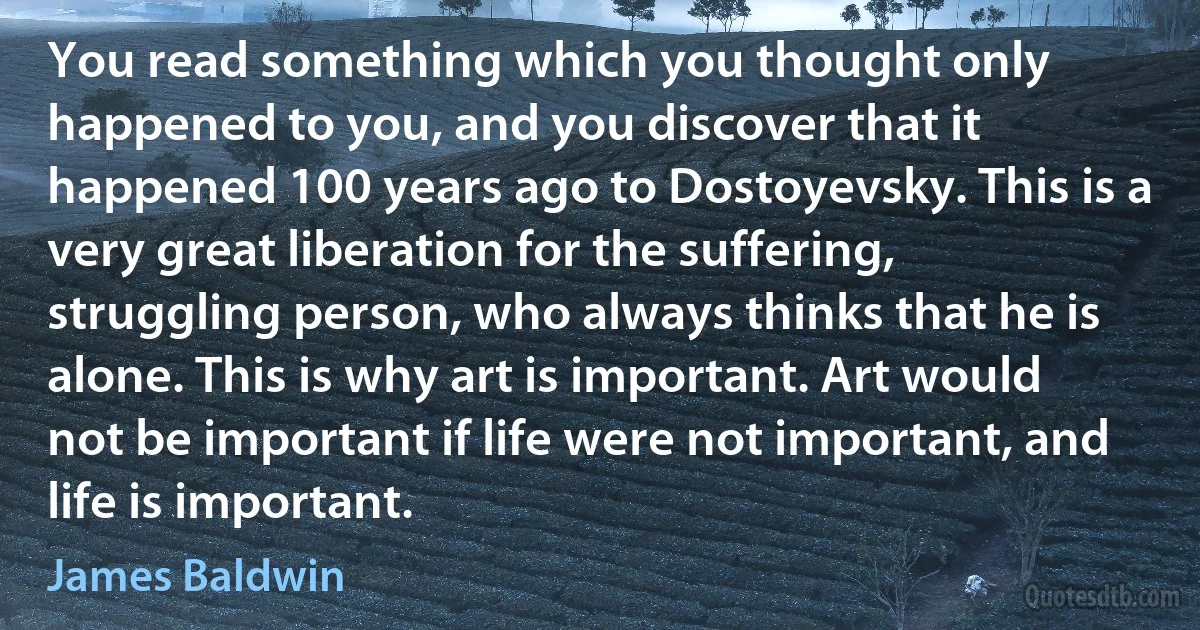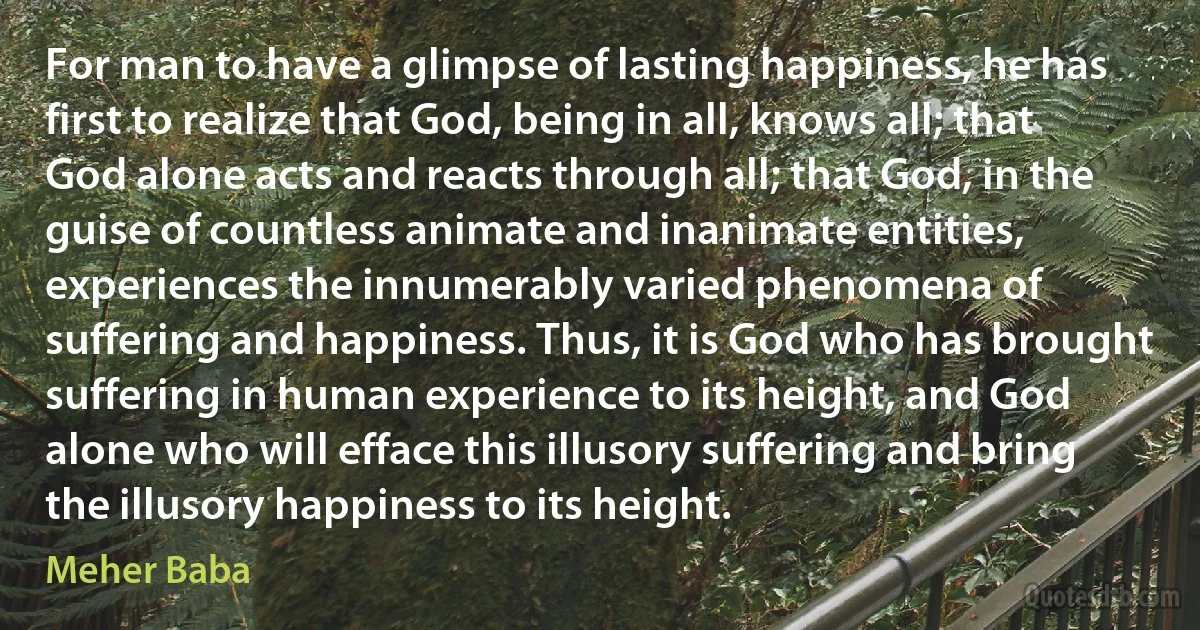Suffering Quotes - page 84
I'm not happy if I'm not doing some physical suffering, like going out on a bike ride or running. First, it's good for you. No. 2, it sort of clears my mind on a daily basis. And it's a job. My job is to suffer. I make the suffering in training hard so that the races are not full of suffering.

Lance Armstrong
It never occurred to me when I was 10 years old that I was going to end up representing an entire-not just community, but nationality. That's not something I ever thought of, because I wasn't a political person then. But I was forced to become one because of the circumstances. At some point, I discovered that a lot of people were suffering unnecessarily. I really started to understand that everyone has a responsibility to others and to a community, that you are not the only person in the world you simply represent, whether you like it or not.

Rita Moreno
But here shewed our courteous Lord the moaning and the mourning of the soul, signifying thus: I know well thou wilt live for my love, joyously and gladly suffering all the penance that may come to thee; but in as much as thou livest not without sin thou wouldest suffer, for my love, all the woe, all the tribulation and distress that might come to thee. And it is sooth. But be not greatly aggrieved with sin that falleth to thee against thy will.
And here I understood that that the Lord beholdeth the servant with pity and not with blame. For this passing life asketh not to live all without blame and sin.

Julian of Norwich
Something about the fact that I made some contribution to either my country, or those who were less well off. I think back to what Camus wrote about the fact that perhaps this world is a world in which children suffer, but we can lessen the number of suffering children, and if you do not do this, then who will do this? I'd like to feel that I'd done something to lessen that suffering.

Robert F. Kennedy
The same could be said of Henry Kissinger. While many in the United States still see Nixon and Ford's former secretary of state as an elder statesman, the rest of the world sees him as a war criminal responsible for the deaths and suffering of millions in Chile, Vietnam, Laos, Argentina, East Timor, and Cambodia, to name a few.

Amy Goodman
No nation, creed, or race was any better or worse than another; all were flawed, all were equally doomed to suffering, mostly because they couldn't see that they were all alike. Mortals might have been contemptible, true, but not evil entirely. They did enjoy killing one another and frequently came up with ingenious excuses for doing so on a large scale-religions, economic theories, ethnic pride-but we couldn't condemn them for it, as it was in their moral natures and they were too stupid to know any better.

Kage Baker
Today, grave dangers attend the process of hastening withdrawal, and the legal safeguards will require most careful working out, and even then grave and serious issues might develop. But some hastening of the processes of death is in order and must be worked out. Primarily, however, the will-to-die of the patient is not based at this time on knowledge and on mental polarisation, or upon an achieved continuity of consciousness, but on emotional reactions and a shrinking from pain and from fear. Where, however, there is terrible suffering and absolutely no hope of real help or of recovery, and where the patient is willing (or if too ill, the family is willing), then, under proper safeguards, something should be done. But this arranging of the time to go will not be based on emotion and upon compassion, but on the spiritual sciences and upon a right understanding of the spiritual possibilities of death.

Alice Bailey
In poetry, my grandmother is much more vicious and hurtful...In the book, she comes across as this likable character. And she was! She was always the life of the party, a fun-loving person. ... In the poetry my mother is more of a martyr, always suffering from leaving her whole family in Cuba. But in the book she's like this control freak, like this warden of the house. I realized that was her psychological response to the loss she had experienced: She wanted to control life. She couldn't tolerate one more loss in her life.”.

Richard Blanco
It will pay Government to give those people who are suffering innocence, justice and liberty. if not I will be compelled to show some colonial stratagem which will open the eyes of not only the Victoria Police and inhabitants but also the whole British army and no doubt they will acknowledge their hounds were barking at the wrong stump.

Ned Kelly
[O]ut beyond the stars, there exists a divine, blessed realm, free of the materiality of this earthly one. This is the realm of Barbelo, a name that gnostics gave the celestial Mother, who lives there with, among others, her progeny, a good God awkwardly called the Self-Generated One. Jesus, it turns out, is not the son of the Old Testament God, whose retinue includes a rebellious creator known as Yaldabaoth, but an avatar of Adam's third son, Seth. His mission is to show those lucky members of mankind who still have a "Sethian” spark the way back to the blessed realm. Jesus, we learn, was laughing at the disciples' prayer because it was directed at their God, the Old Testament God, who is really no friend of mankind but, rather, the cause of its suffering.

Jesus Christ
Jesus then realized he had been brought here under false pretences, as the lamb is led to sacrifice and that his life had been planned for death since the very beginning. Remembering the river of blood and suffering that would flow from his side and flood the entire earth, he called out to the open sky where God could be seen smiling, Men, forgive Him, for He knows not what He has done.

Jesus Christ
Wherever you are tonight, you can make it. Hold your head high, stick your chest out. You can make it. It gets dark sometimes, but the morning comes. Don't you surrender. Suffering breeds character, character breeds faith. In the end faith will not disappoint.
You must not surrender. You may or may not get there but just know that you're qualified. And you hold on, and hold out. We must never surrender. America will get better and better.

Jesse Jackson
If you believe in the... War in Heaven where a third of the angels were cast out... it was about man's choice and he would provide a saviour and Satan's plan was... I'll save everybody... just take away their choice and give me the credit...that plan was rejected... because God knew that...failure was important ...the progressives have... replaced God... they are taking.... rights are not given to us by our creator, they created by congress, they are taking the role of God, and so they are taking away our suffering, they are taking away all of our pain, all of the opportunity to fail...

Glenn Beck
When I was in Vietnam, so many of our villages were being bombed. Along with my monastic brothers and sisters, I had to decide what to do. Should we continue to practice in our monasteries, or should we leave the meditation halls in order to help the people who were suffering under the bombs? After careful reflection, we decided to do both-to go out and help people and to do so in mindfulness. We called it engaged Buddhism. Mindfulness must be engaged. Once there is seeing, there must be acting. ...We must be aware of the real problems of the world. Then, with mindfulness, we will know what to do and what not to do to be of help. p. 91.

Nhat Hanh
During the war in Vietnam, we young Buddhists organized ourselves to help victims of the war rebuild villages that had been destroyed by the bombs. Many of us died during service, not only because of the bombs and the bullets, but because of the people who suspected us of being on the other side. We were able to understand the suffering of both sides, the communists and the anti-communists. We tried to be open to both, to understand this side and to understand that side, to be one with them. That is why we did not take a side, even though the whole world took sides. We tried to tell people our perception of the situation: that we wanted to stop the fighting. But the bombs were so loud. Sometimes we had to burn ourselves alive to get the message across, but even then the world couldn't hear us.

Nhat Hanh
[I]f the occasion should come to assert the authority of England, a democratic Government, resting on the confidence and support of the whole nation, and not on the favour of any limited class, would be very strong. It would know how to make itself respected, and how to maintain the obligations and the honour of the country. I think foreign rulers would be very ill advised if they were to assume that because we are anxious to avoid all cause of quarrel with our neighbours we are wanting in the old spirit of Englishmen, or that we should be found very tolerant of insult or long suffering under injury.

Joseph Chamberlain
It will naturally occur to every virtuous and generous mind, and to none more probably than to the Emperor of Russia's own,-indeed it is the first impression which presents itself to every reflecting observer when he contemplates the internal state of European Turkey-viz. : Is it fit that such a state of things should continue to exist? Ought the Turkish yoke to be for ever rivetted upon the necks of their suffering and Christian subjects; and shall the descendants of those, in admiration of whom we have been educated, be doomed in this fine country to drag out, for all time to come, the miserable existence to which circumstances have reduced them?

Robert Stewart, Viscount Castlereagh
Beggars do not work, it is said; but then, what is work? A navvy works by swinging a pick. An accountant works by adding up figures. A beggar works by standing out of doors in all weathers and getting varicose veins, bronchitis etc. It is a trade like any other; quite useless, of course - but, then, many reputable trades are quite useless. And as a social type a beggar compares well with scores of others. He is honest compared with the sellers of most patent medicines, high-minded compared with a Sunday newspaper proprietor, amiable compared with a hire-purchase tout-in short, a parasite, but a fairly harmless parasite. He seldom extracts more than a bare living from the community, and, what should justify him according to our ethical ideas, he pays for it over and over in suffering.

George Orwell



